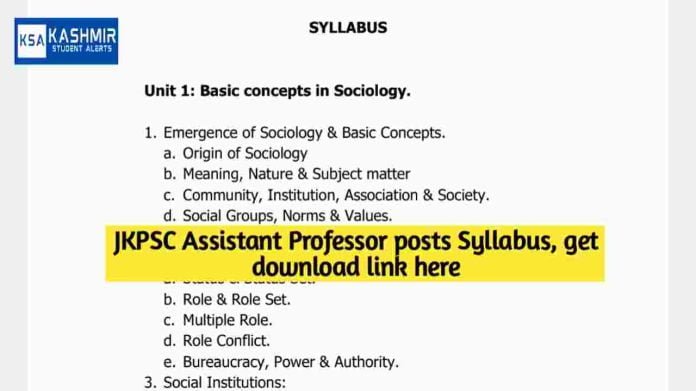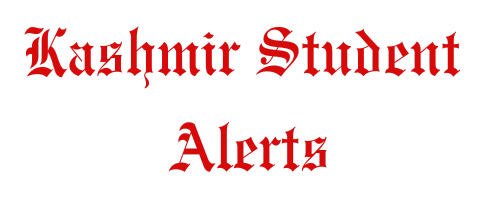JKPSC Assistant Professor posts Syllabus 2023
SYLLABUS FOR THE POST OF ASSISTANT PROFESSOR SOCIOLOGY IN HIGHER EDUCATION DEPARTMENT
SUBJECT: SOCIOLOGY
SYLLABUS
Unit 1: Basic concepts in Sociology.
1. Emergence of Sociology & Basic Concepts.
a. Origin of Sociology
b. Meaning, Nature & Subject matter
c. Community, Institution, Association & Society.
d. Social Groups, Norms & Values.
e. Sociological Perspectives.
2. Social Structure:-
a. Status & Status Set.
b. Role & Role Set.
c. Multiple Role.
d. Role Conflict.
e. Bureaucracy, Power & Authority.
3. Social Institutions:
a. Family
b. Marriage
c. Kinship
d. Economy
e. Religion
4. Social Processes
a. Socialization
b. Social Change
c. Social Conflict
d. Social Mobility
e. Social Control
5. Social Stratification
a. Social Differentiation, Hierarchy & Inequality
b. Caste & Class
c. Gender, Sexuality & Disability
d. Race, Tribe & Ethnicity
Unit-II Sociological Theory.
1. Classical Sociological Traditions
a. Emile Durkheim
b. Max Weber
c. Karl Marx
d. Vilfredo Pareto
2. Structural Functionalism & Structuralism.
A. Bronislaw Malisnowski
B. A.R. Radcliffe Brown
C. Talcott Parsons
D. Robert K. Merton
E. Claude Levi Strauss.
3. Hermeneutics & interpretative traditions
a. G.H. Mead
b. Karl Mannheim
c. Harold Garfinkel
d. Erving Goffman
e. Clifford Geertz
4. Post Modernism, Post Structuralism and Post Colonialism
a. Edward Said
b. Pierse Bourdieu
c. Michel Foucault
d. Jurgen Habermas
e. Anthony Giddens
f. Manuel Castells.
5. Indian thinkers
a. M.K. Gandhi
b. B.R. Ambedkar
c. Radha Kamal Mukherjee
d. G.S. Ghurye
e. M.N. Srinivas
f. Irawati Karve
Unit III Research methodology
1. Conceptualizing social reality
a. Philosophy of science
b. Scientific Method & Epistemology in Social Science
c. Hermeneutic Tradition
d. Objectivity & Reflexivity in Social Science
e. Research Ethics
2. Formulating Research Design
a. Types of Research Design
b. Induction & Deduction
c. Fact, Concept & Theory
d. Hypothesis, Research Questions & Objective
3. Qualitative & Quantitative Research
a. Ethnography
b. Survey Method
c. Historical Method
d. Comparative Method
e. Content Analysis
4. Techniques
a. Sampling
b. Scaling
c. Questionnaire & Schedule
d. Observation, Interview & Case Study
5. Data Analysis
a. Coding, Editing & Tabulation
b. Statistical Analysis
c. Interpretation & Data Analysis
d. Bibliography & Report Writing.
Unit-IV Rural & urban societies
1. Understanding Rural Societies
a. Basic features of Rural Society
b. Village: Definition & Types
c. Land Ownership & Agrarian Relation
d. Agrarian Social Structure & Emergent Class Structure.
2. Rural Movements & Development Programme
a. Agrarian Unrest & Peasant Movements
b. Decline of Agrarian Economy, De-peasantization & Migration
c. Community Development Programme & Land Reforms
d. Panchayati Raj Institution, Co-operatives & Self Help Groups.
3. Understanding Urban Society
a. Urban, Urbanism & Urbanization.
b. Towns, Cities & Megacities
c. Industry, Service & Business
d. Neighbourhood, Slums & Ethnic Enclaves.
4. Urban problems:
a. Human Migration & Urban Cult
b. Urban Poverty , Environment & Housing
c. Urban Movements & Violence
d. Urban Governance.
Unit-V Family, Marriage & Kinship
1. Understating Kinship
a. Defining Kinship
b. Kinship Usages
c. Kinship Terminology
d. Decent & Inheritance
2. Marriage & Affinity
a. Meaning & Evolution
b. Alliance Theory
c. Marriage Transaction
d. Rules Of Residence
3. Family
a. Structure & Function
b. Incest Taboo
c. Theoretical Perspectives
d. Emergent Forms Of Family
Emerging Trends
a. Changing marriage Practices
b. Gender Relations & Power Dynamics
c. Family Laws
d. New Reproductive Technologies & Surrogacy.
Unit-VI Environment & Sustainable Development
1. Concepts & Issues
a. Environmental Sociology
b. Social & Human Ecology
c. Environmentalism
d. Global Issues: Global Warming, Biodiversity Laws,
Climate Change
2. Theoretical Approaches
a. Classical Sociological Traditions
b. New Ecological Paradigm
c. Risk Theory
d. Ecological Modernization Theory
3. Sustainable Development
a. Meaning & Emergence
b. Components of Sustainable Development
c. Earth Summit
d. Sustainable Development Goals
4. Environmental Movements & Issues.
a. Forest Based Movements
b. Land Based Movements
c. Water Based Movements
d. Role of Government & Non-Government Organizations.
Unit VII Indian Society
1. Conceptualizing Indian Society
a) Evolution of Indian Society
b) People of India: Groups and Communities
c) Unity in Diversity
d) Emergence of Ethnic Identities
2. Caste System in India
a) Varna & Jati
b) Caste System: Nature & Features
c) Changes in Caste System
d) Caste & Class Convergence
3. Theoretical Perspective
a) Indological/Textual
b) Structural-Functional
c) Marxian
d) Civilizational
e) Subaltern
4. Process of Change in Indian Society
a) Modernization & Globalization
b) Problem of Minorities
c) Reservation Policy: SC, ST, OBC & Women
d) Tribal Unrest
Unit VIII Society, Economy & Politics
1. Understanding Economy & Society
a) Exchange, Golf, Capital Labour & Market
b) Mode of Production Debate
c) Models of Economic Development
d) Property & Property Relations
e) Commodification of Rituals
2. Politics & Society
a) Tribe, Nation State & Border
b) Governance & Development
c) Bureaucracy
d) Public Policy
3. Social Movements & Protests
a) Political Factors & Pressure Groups
b) Movements based on Caste, Ethnicity, Ideology,
Gender & Religion.
c) Reservation & Politics.
d) Civil Society & Citizenship.
4. Changing Economy
a) Poverty & Exclusion
b) Changing Labour Relation
c) Digital Economy & Ecommerce
d) Consumerism & Consumption
Unit IX Sociology of Change & Development
1. Understanding Development
a) Concept of Social Development
b) Evolution & Diffusion
c) Development & Progress
d) Modernization & Development
2. Perspectives on Development
a) Liberal
b) Capitalist
c) Socialist
d) Gandhian
e) Gender & Development
3. Science, Technology & Development
a) History of Technological Development
b) State Policy, Digital Divide & Inclusion
c) E-Governance, Surveillance Society & Cyber Crime
d) Food & Technology
e) Virtual Community
4. Critiques of Development
a) Development & Displacement
b) Indian Experience of Development
c) Current Debates in Development
d) Social Exclusion & Inclusive Policy
Unit X Culture & Symbolic Transformation
1. Understanding Culture
a) Culture: Concept & Types
b) Determination of Culture
c) Cultural Lag, Ethnocentrism & Xenocentrism
d) Cultural Identity & Mobilization
2. Cultural & Everyday Life
a) Culture & Politics
b) Sports & Culture
c) Gender, Body & Culture
d) Culture & Environmentalism
3. Cultural Processes
a) Acculturation
b) Assimilation
c) Enculturation
d) Integration
4. Symbolic Transformations
a) Signs & Symbols
b) Rituals, Beliefs, Practices
c) Ethics & Morality
d) Religion & Economy
e) New Religions Movement
JKPSC Assistant Professor Syllabus notification





